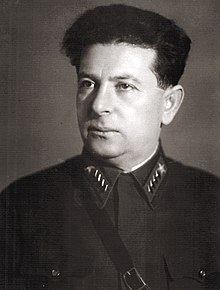Lev Sakharovich Mechlis
Lev Mekhlis ( Russian Лев Захарович Мехлис , born January 1, jul. / 13. January 1889 greg. In Odessa ; † 13. February 1953 in Moscow ) was a Soviet politician.
Life
Between 1907 and 1910 Mechlis, the son of a worker, joined the Jewish Social Democratic Workers' Party "Poalei Tzion". Drafted in 1911, he participated in the World War II as an artilleryman and initially joined the RSDRP as a Menshevik , before switching to the Bolsheviks of the KPR (B) in 1918 . For the party he worked in Odessa, Yeisk and Kharkov . In 1919 he became political commissar of a brigade and later a division of the Red Army . In the Russian Civil War he fought against Denikin's White Army in Ukraine .
After several positions at the Central Committee of the Council of People's Commissars , more precisely in the People's Commissariat of Workers and Peasants Inspection under Josef Stalin's leadership, he was secretary to Stalin, who was now elected general secretary, from 1923 to 1930, and he enjoyed his trust. After studying at the Communist Academy and the Institute of the Red Professorship , he became the editor of the party newspaper Pravda in 1930 . A candidate since the 17th Party Congress in 1934, he was appointed a member of the party's central committee in 1939. 1940 to 1941 and 1946 to 1950 he was People's Commissar for State Control. Through Stalin's constant warning to be vigilant against “enemies of the people”, Mechlis himself became an informer.
Mechlis was appointed Army Commissioner 1st degree, which corresponded to the rank of Army General. 1937–1940 he headed the political department of the Red Army and personally arrested most of the commanders of Blücher's Far East Army . In order to prevent defeatism , Stalin appointed him deputy in 1941 after he himself had assumed the office of People's Commissar for Defense. In early 1942, Mechlis was sent to the Crimea to represent the headquarters on the Crimean front. Due to military inability, indiscipline and failure to carry out orders, he was demoted to lieutenant general because he did nothing to prepare the Crimean front for defense.
By mid-1942 he had passed 157,000 death sentences in a million court martial and was responsible for the murder of 25,000 Polish officers and officials who had been shot by the NKVD near Katyn and elsewhere in early 1940 .
As a representative of the party, he interfered in the strategic and tactical planning of the military and denounced numerous commanders. Konstantin Simonow attributed the defeat of Kerch to Mechlis, who among other things had forbidden entrenchment in order not to diminish the “offensive spirit of the soldiers”. Simonow processed Mechlis in his trilogy of novels about the Great Patriotic War under the name "Lwow".
He spent the rest of the war as 1st member of the war council in the staffs of various fronts (army groups). He was transferred from front to front because there were always disputes with the respective commander in chief. Mechlis was the most hated person in the Red Army. Many marshals and generals expressed their absolutely negative opinion of Mechlis in their memoirs.
From 1937 to 1950 Mechlis was a member of the Supreme Court of the Soviet Union and from 1938 to 1952 also of the organizational office of the Central Committee of the CPSU . On October 27, 1950, he was retired for health reasons. After Mechlis' death, his urn was buried on the Kremlin wall in Moscow.
Mechlis was married to Jelisaveta Abramovna Mlynarchik († 1973) and had a son Leonid (* 1922).
Awards
- 4 Order of Lenin
- Order of Kutuzo 1st degree
- Order of the Red Star
- Suvorovorden 1st degree
- 2 Order of the Red Banner
Web links
Individual evidence
-
↑ Berthold Seewald: United in killing, united in death. In: Welt.de . August 13, 2012, accessed August 13, 2020 . Berthold Seewald: Second World War: When Stalin's executioner lost to the Wehrmacht. In: Welt.de. October 9, 2012, accessed October 3, 2016 .
- ↑ Мехлис Лев Захарович: Биографический Указатель. In: hrono.ru. Retrieved August 13, 2020 (Russian).
| personal data | |
|---|---|
| SURNAME | Mechlis, Lev Sakharovich |
| BRIEF DESCRIPTION | soviet politician |
| DATE OF BIRTH | January 13, 1889 |
| PLACE OF BIRTH | Odessa |
| DATE OF DEATH | February 13, 1953 |
| Place of death | Moscow |
